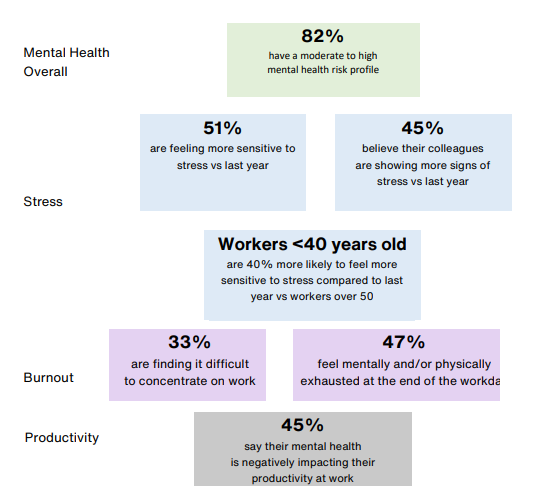54% Asian workers fear consequences of mental health disclosure to employers: AMHI report

Despite organisations' efforts to implement employee well-being initiatives, mental health in the workplace is an escalating concern, particularly in the aftermath of the COVID-19 pandemic. A survey conducted by Aon and TELUS Health found that approximately 82% of 13,000 Asian workers hinted at a 'moderate to high risk' of developing mental health issues.
The report, titled 'Aon TELUS Health Asia Mental Health Index,' examined workplace mental health and its impact on productivity across 12 Asian countries. Additionally, it offered suggestions for enhancing the mental health and resilience of employees.
Key findings from the report:
Alarmingly, 35% of the surveyed employees reported ‘high’ mental health risk, and 47% reported moderate mental health risk. This highlights a greater need for workplace well-being in Asia.

Specifically, 30% of workers under ‘high risk’ and approximately 7% of workers under ‘moderate risk’ pose a financial threat to businesses due to reduced productivity.
The reasons identified for making mental well-being a concern among employees in these Asian countries include additional work responsibilities, peer pressure, mental health stigma, and the impact of the COVID-19 pandemic.
"Good mental health is essential for individuals to thrive, and supporting employees’ mental wellbeing within organisations is necessary for maintaining workforce resilience, high levels of engagement, and successful and expected productivity outcomes. Business performance and innovation also depend on resilient workforces, as good mental health is fundamental for ensuring employees are adequately equipped to solve problems," stated the report.
Workplace Stress, Anxiety and Burnout on the rise
A serious concern arises regarding the effectiveness of employee engagement programmes at the workplace, as the analysis of this report reveals the following:
- 45% of surveyed workers reported increased stress, anxiety, and burnout.
- 51% of them conveyed an 'increased sensitivity' to stress compared to last year.
- 45% of them reported an increase in 'stressed-out' colleagues this year.
- 30% of the workers are facing concentration issues at work.
Nearly half of the surveyed workers reported feeling mentally and physically drained by the time their workday concludes.
In the global context, a survey by McKinsey Health Institute encompassing 4,000 workers across four Middle East countries, found that over 50% of employees feel increasing burnout and distress in the workplace. Whereas, another survey found that 38% of 2,400 US workers reported higher levels of burnout compared to the previous year.
Factors affecting mental well-being in the workplace
As the study tried to find out the reasons leading to the deteriorating mental health of Asian workers, and revealed the top factors:
- Increased workload,
- Social stigma attached to mental health
- Pressure from both family and friends
- Impact of the COVID-19 pandemic,
Moreover, public and self-stigma is an overwhelming problem for workplaces and society across Asia. More than 50% of the employees are concerned about limited career opportunities if they open up about their mental health. Whereas, 49% of them feel ‘different’ treatment if they share mental health issues with them. Due to this, the affected employees feel ‘negative’ about themselves.
Commenting on the report analysis, Tim Dwyer, CEO of Health Solutions APAC at Aon said, “Organisations that do not implement support structures or choose to dismiss the impact of mental health in their workplace will realise there is a significant cost in doing nothing. Supporting employees’ well-being is necessary for organisations to maintain high levels of engagement and productivity to deliver measurable ROI. Lack of support and the stigma attached to mental health issues are key barriers to why employee mental health issues remain unresolved. Organisations must therefore address these issues head-on while developing an integrated strategy informed by data and insights.”
Mental health assistance: key challenges
Providing timely support for mental health issues can address consequences such as absenteeism, reduced productivity, and employee turnover. Nonetheless, obstacles to seeking help persist, and the top barriers are:
- Cost: Approximately 43% of Asian workers cited it as the primary barrier to seeking mental health support.
- Limited Information: The second barrier is the lack of information about available sources of support for mental well-being.
- Awareness: The third barrier is employees not knowing what kind of support they need.
- Stigma: The fourth barrier for employees seeking mental health support is concerns about what others would think about their mental health issues.
Jamie MacLennan, managing director of APAC, TELUS Health said, “The prevalence of overwhelming and crippling levels of stress within the workplace simply cannot go ignored; far too many people in Asia are dealing with elevated stress, anxiety, isolation and depression, which has a direct correlation to workplace productivity. Many businesses are still not taking the mental health of their staff seriously and when not addressed and supported will lead to decreased productivity and increased absenteeism and presenteeism. Addressing the mental health and wellbeing of staff is no longer a ‘nice to have’ – rather, it is a commercial imperative.”
Extending mental health support to workers
Mental and emotional health issues affect employees across industries and regions in Asia. Therefore, employers must adopt targeted initiatives to address these challenges, especially for groups at moderate or high risk.
One effective approach is implementing Employee Assistance Programs (EAPs), which provide support for various personal challenges.
Employers are effectively enhancing employee health and well-being in the workplace, as 85% of organisations in APAC reportedly have a well-being strategy, and 77% have integrated it into their overall business and talent strategy.
Similarly, in light of mental health awareness and well-being in the workplace, the Singapore Health Promotion Board (HPB) launched ‘It's OKAY to Reach Out’ to normalise conversations about Singaporeans seeking mental health support.
Additionally, a report by Gartner suggested that HRs can reduce up to 46% of change fatigue by establishing a psychologically safe ecosystem in the workplace.


